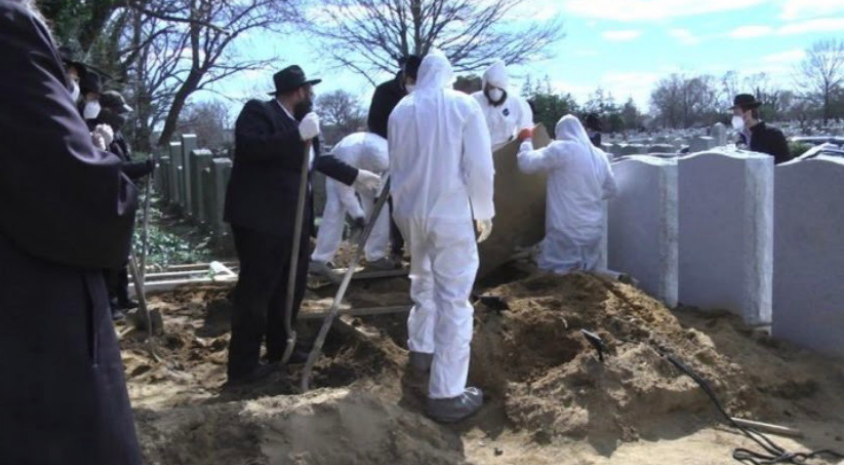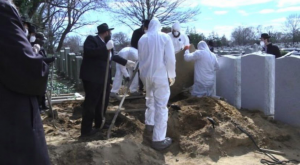

Written By: Chaya Gurkov
My father’s day has begun long before I pull myself out of my bed in the morning. His departure from my home in the wee hours of the morning means a day filled with exertion, physically and emotionally. Yet when he comes back home, exhaustion imprinted on his face and posture, his tenor remains resolute. Only when he makes his way over to sit down, to review the day and to catch up with his family, does he let himself sigh.
“Today, we buried five,” he says.
Five might not seem like an exorbitant number, but for the Crown Heights burial organization, the Chevrah Kedisha, that figure hints towards the incredible number of burials done in these past two weeks alone: a number which has superseded what the organization usually takes care of within the span of a year.
I barely see my father, Rabbi Levi Gurkov, at home nowadays, during a time when everyone is seeing too much of their families. If he’s not out, seeing that the bodies of the deceased are prepared for burial according to the proper Jewish customs, he’s pacing my house on the phone, arranging for the next one.
“Everyone wants a normal burial but these are not normal circumstances,” he tells me.
Whittled down to just seven members out of its original 50, the members of Chevrah Kedisha that are still active are overburdened with having to tend to all the steps of the funeral, which have become increasingly tedious and harder to carry out because of COVID-19, instead of their normal posts.
According to Jewish law, having a proper burial is of optimal importance, and every step is laboriously detailed: arranging for the pick-up of the body, purifying the body, dressing it in its proper garments, leading the funeral, and of course, actually burying the body. Among these, my father added, are new measures now added because of coronavirus, like driving through the streets of the community so people can pay their respects without having to break social distancing.
“Sometimes, we are the only people at the levayah (funeral) of the deceased,” Rabbi Gurkov says with a heavy heart, “and we have to set up a virtual meeting so that the family could watch their grandfather, their father being buried.”
This marks Rabbi Gurkov’s 27th year as a part of the Chevrah Kedisha. He joined at the young age of 22 when it was educating young future rabbis to train in kosher burial, looking to fulfill the directive from the Chabad leader and Rebbe Menchum Mendel Schneerson, to help people in any way you can.
But speaking to my him, I noticed that as he told me about the hours he has to wait to pick up the body from the makeshift morgues in the back of hospitals, or the lines he has to go through to get the proper paperwork signed, it was nothing compared to the pain he felt for the suffering families.
“The family can’t see their loved ones who are sick in the hospital, which makes them feel like they were robbed of their obligation to be there for their family members during a time like this, and the community can’t pay their respects at Shiva – only virtually which loses the personal touch,” Rabbi Gurkov said. “This virus is stealing the dignity of the dead and the dignity of the living.”
Despite the unprecedented hardships coronavirus is wreaking across Jewish communities, my father is never one to revel in the negative. Moving to Long Island when he was newlywed to build a Chabad house with little more than the clothes on his back and the hope that people will reciprocate, the goodness of people never ceases to amaze him.
“People have been reaching out to us more than ever before, giving us whatever they can for the families that are suffering,” he told me, “so we find ourselves becoming a kind of life support for the families after the tragedy of a death.”
The interview was interrupted by the shrill ringing of a cell phone. My father had received a phone call from a member of the Chevrah Kedisha. He answered, of course. I heard him tell the person on the line that no matter what the hour is, he’s available to do whatever needs to be done. That is when it crystalized that this man is one of the most inspirational people I have the honor of knowing, especially as he finished our conversation with this.
“Sometimes, we just relent to the way G-d does things. There’s no blaming anyone for what’s going on, there’s no pointing fingers, so we just have to surrender to the way G-d is running the show, and do what we can to help.”
